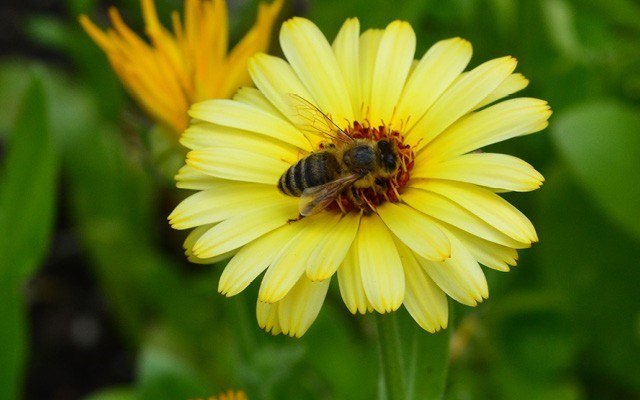In recent years, more and more people have learned about the challenges facing bees.
Backyard beekeeping is booming, with small businesses opening up to make the whole thing easy. But it's the wild bees — experts and bee enthusiasts alike agree — that really need our attention.
Canada has over 800 species of bees, and "they don't have beekeepers like honey bees have," said Beatrice Olivastri, CEO of environmental organization Friends of the Earth (FOE).
According to Olivastri, scientists are in agreement that between a quarter and a third of wild-bee populations are at risk. Industrial farms and urban sprawl eats into their habitat, and insecticides kill them, she explained.
"Bees need a diversity of flowers," said Olivastri. "Monoculture crops are one reason why wild honey bees are not as abundant as they once were."
In a bid to generate awareness about wild bees and gain a better understanding of how the various species are doing, FOE has devised a clever ploy: The Great Canadian Bumble Bee Count.
To take part, you print off a "bumble bee census" — which can be found on FOE's website — and try to identify the bees that you spot.
The census features stylish illustrations of bees. (There are different versions for Western and Eastern Canada.)
Participants are asked to send in a photo of the bees they find and try to identify them.
"It's not easy. We're saying make your best guess. And then we'll have scientists look at them," said Olivastri.
Closer to home, the Fairmont Chateau Whistler is showing how bee-friendly initiatives can be both good for business and the planet.
"This is our bee hotel," said executive chef Isabel Chung, standing in front of one of two A-frame wooden structures that stand on the Fairmont's rooftop garden. "It's A-frame because it's Whistler — like the old alpine cottages."
The bee hotel, explained Chung, provides "solitary wild bees with somewhere to lay their eggs, so they can reproduce."
The sunbaked area features an impressive garden, with bee-approved Indigenous plant life like Lavender, and other herbs and spices that are used in the luxury hotel's kitchens.
"Short of paying someone to walk around all day with a fine paint brush," we could never get the pollination the bees provide, said Chung, who keeps a stack of bee books in her room.
Chung's passion for bees began in Seattle, where she was introduced to beekeeping by the executive chef of what is now the Fairmont Olympic Hotel.
"The whole idea and concept (of working with bees) really lit me on fire. I just wanted to learn more and more and more," she said.
"Bees are responsible for one in every three bites of food you're going to obtain at a grocery store... I want to make sure the next generation of humankind has access to the food and products we have today."
In addition to nurturing wild bees, the Fairmont keeps its own honey bees. Located in a restricted part of the roof are bee boxes. Stacked atop each other, along the edge of the building, they house entire bee colonies — stand-alone societies with drone bees, worker bees, nurse bees and (at the top of the hierarchy) queen bees.
Chung (fondly known as the hotel's queen bee) reckons each colony will produce around 22.7 kg of honey.
That honey is used primarily for "raw applications," said Chung, like dressings, cupcakes, and parfaits.
Heating it up messes with the "flavour profile," she added.
Being able to serve it to guests is great, she said. "It's such a privilege to have — actual honey that comes from your garden."
Olivastri said the government needs to get serious about protecting wild bees.
But she also outlined a number of things people can do to care for them, including planting native species of plants, and creating a garden that has flowers that bloom throughout the year.
Olivastri also recommends leaving bare patches of soil in your garden, where bees can nest.
She hopes The Great Canadian Bee Count will generate increased interest in wild bees, which will in turn prompt the government to better protect their habitat and dedicate additional money to their study.
"We have a federal government that needs to reinvest in science. And this (bees) is one of the areas where we hope it will."




